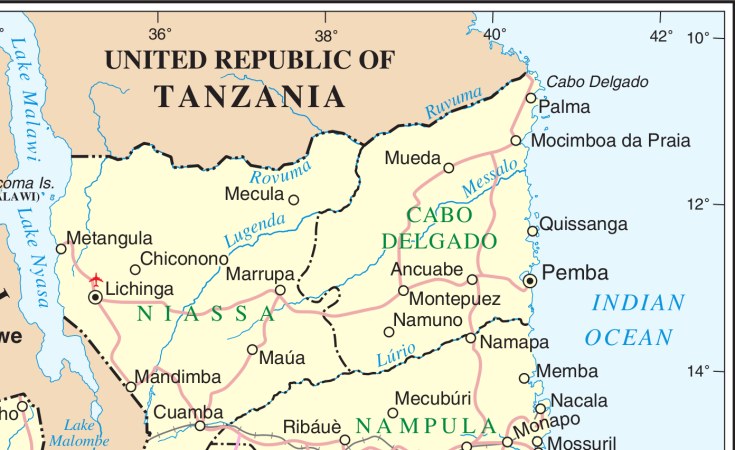Political leaders hope to assuage investors' security concerns, which have held up natural gas extraction in Cabo Delgado.
The presidents of Mozambique and Rwanda have been making victory speeches about the Cabo Delgado insurgency being almost over. They are creating the impression that al-Shabaab is close to being defeated, and that citizens and investors can return to the region, which has been the target of violent attacks since 2017. Many residents and investors have indeed returned - but that doesn't mean the insurgency is over.
The upbeat political speeches come after two years of foreign troop deployments to the province from Rwanda, the Southern Africa Development Community and the national defence force. However, while attacks have decreased and seem contained in the Palma, Mocímboa da Praia, Nangade, Muidumbe, Macomia and Quissanga districts, widespread insecurity remains.
The leaders' discourse seems aimed at persuading investors of liquefied natural gas (LNG) projects to resume their work. In 2021, French petroleum company TotalEnergies declared a force majeure and suspended the construction of a US$20 billion LNG processing plant following an attack in the coastal town of Palma.
One of the conditions TotalEnergies stressed for resuming its work was 'the restoration of security in the region, the resumption of public services and the return to normal life for the people of the region.'
In May 2023, President Filipe Nyusi said Cabo Delgado's security situation had returned to normal and TotalEnergies could restart its projects. Then in June, Rwandan President Paul Kagame assured that, 'Eighty percent of the insurgency problem has been addressed,' and investors who had fled were returning.
In the same week, Mozambique's Defence Minister Cristóvao Chume held a tour with journalists through two of the five districts targeted by militants. He said the immediate objective of the foreign troop operations - to free the zones occupied by insurgents and create basic conditions for the population's return - had been achieved.
Chume said between 60% and 80% of the population who had fled the attacks had returned to their areas of origin, indicating stability. The only remaining challenge, said Chume, was guaranteeing 'basic services' such as 'water, health, infrastructure and humanitarian support to lift the population out of poverty.'
Seeing people return to a conflict zone doesn't mean the threat is over
Foreign troop deployment in five districts of Cabo Delgado certainly helped dislodge the insurgents from their bases and expel them from the towns and villages they controlled. International Organization of Migration data indicates that by the end of March 2023, over 400 000 of the roughly one million displaced people had returned.
However, accurate figures are lacking. Some have managed to return home, and many have partially returned, living in secure district headquarters but unable to go further. In some areas, including Palma, 'returnees' include people not from the district.
Seeing people return to a conflict zone doesn't mean the threat is over. The insurgency remains active and has adapted to the almost 5 000 foreign security personnel deployed, along with Mozambique's soldiers. The insurgents dislodged from their bases haven't been defeated and no top leaders have been killed or captured. They still command a reduced but heavily armed militant group that attacks the military but engages with civilians less violently than before.
The return of many internally displaced people could also reflect their need to escape the terrible conditions of the resettlement areas. Even though their homes remain affected by instability and living conditions are poor, they can farm, fish and feed their families there.
The only two districts that have been secured are those where LNG is being explored and extracted
Insurgents continue infiltrating these communities, including to radicalise and recruit civilians. Days after Nyusi and Kagame's speeches, extremists killed at least eight soldiers in Macomia, including members of the Quick Reaction Force, a special Mozambican unit trained by the European Union's training mission in the country. This shows that the militants haven't been defeated and are unlikely to be removed exclusively by military means.
Realising they have lost ground, the insurgents have changed their strategy from attacking civilians to 'winning hearts and minds' - a new development for Cabo Delgado, but one used by other extremists in Africa. Boko Haram in Nigeria engages local populations and uses civilians as a shield to frustrate the government's counter-insurgency operations. Militants also use civilians as informants and for logistical purposes.
With citizens returning, insurgents in Cabo Delgado have a wider scope to operate. But they will need to ensure, through intimidation, that residents don't cooperate with the security forces. Community members often find themselves in the unenviable position of being in danger from the government and insurgents.
In Cabo Delgado, the state has a limited presence and civil-military relations are poor, with the defence force accused of torturing and even killing civilians. In this context, the militants' strategy of supporting the community could work - and could transform the insurgency into a low-intensity, long-lasting conflict.
The militants' strategy of supporting the community could lead to a long, low-intensity conflict
The job of securing Cabo Delgado province has only been 'done' in the two districts where LNG is being explored and extracted - not even the five districts heavily targeted by insurgents have been secured.
This approach risks creating an unsustainable green zone security model, where business and public services flow in a particular area while the surrounding districts remain unstable. This approach creates a permanent threat to economic ventures, with the risk of militants attacking and kidnapping project workers in exchange for ransom.
To achieve real stability, the root causes of Cabo Delgado's conflict must be recognised and addressed. These include, above all, social and economic inequalities in sharing the province's wealth and better management of its natural resources. The local youth also need hope and opportunity, and the circumstances that lead to radicalisation must be prevented.
Borges Nhamirre, Consultant, ISS Pretoria


